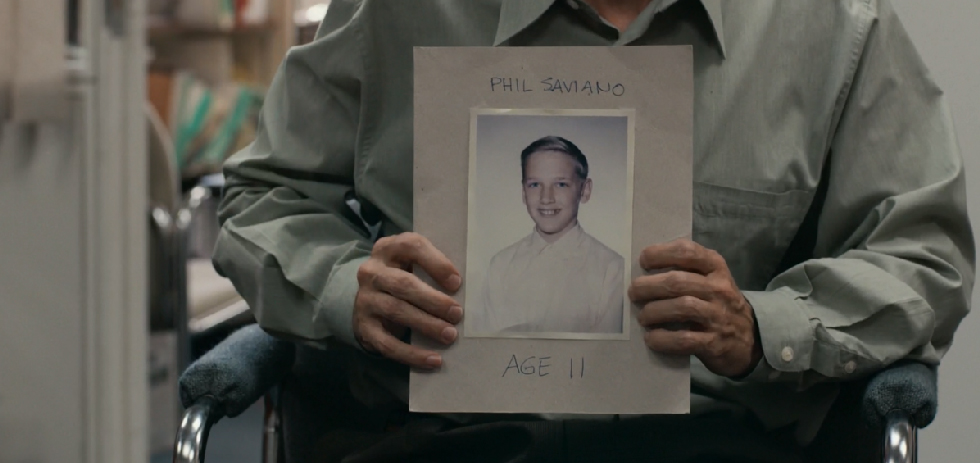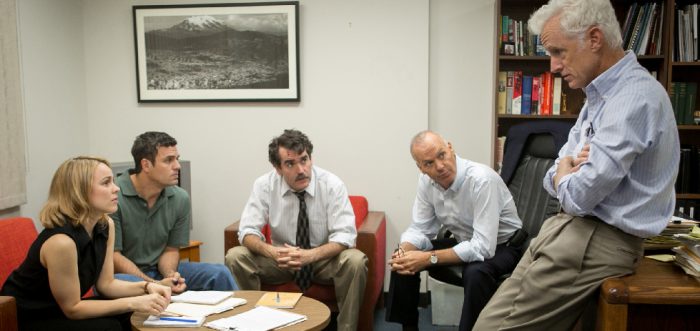
Michael Rezendes comes from a familiar breed of cinematic hero-journalists. Mark Ruffalo plays him as abrupt, obsessive and with a fierce sense of morality. His marriage is strained because he overworks himself; he forgets to eat and finds his greatest relief in thoughtful colleagues delivering him leftovers; his only form of recreation is running to work every morning. He’s an outsider in his native Boston: of Portuguese descent, lapsed Catholic at an early age and with no traces of an East Boston accent. In another film, Rezendes would be the focal point, a one-man tribute to journalistic tenacity. Like so much of Tom McCarthy’s Spotlight, though, many of Rezendes’ idiosyncrasies fade into the background; not only is he merely one member of a sizable investigative team but that team is a merely a means through which to explore the way in which institutions avoid redressing their own habits and traditions.1
Spotlight is the name of the Boston Globe‘s investigative reporting unit. They rely on paper resources but work independently, delivering major stories that take months, if not years, to break. A roll/role call: the team is led by assistant managing editor for investigations Robby Robinson (Michael Keaton) and comprised (in-film) of reporters Sacha Pfeiffer (Rachel McAdams), Matt Carroll (Brian d’Arcy) and Rezendes; they answer to the paper’s assistant managing editor Ben Bradlee Jr. (John Slattery) and, in 2001, the paper’s new editor Marty Baron (Liev Schreiber). Baron sees a story tucked away in the metro section of the Globe about an attorney who claims to have damning evidence about child sex abuse at the hands of local priests. Despite the limp protestations of older journalists that the matter has been looked into, Baron commissions an investigation from the Spotlight team, with the focus on whether the Archbishop of Boston had knowledge of the ongoing abuse.
You know the story going in: the Globe won a Pulitzer for their work and the Catholic Church was engulfed by a global child sex abuse scandal. Like Adam McKay’s recent The Big Short, though, McCarthy and co. confront their audience as to how much we collectively forget about our own recent history. The information uncovered by the Spotlight team is still shocking today, fifteen years on, and the closing titlecards of the film—which detail the extent of abuse and the Church’s punishment of the Archbishop—are absolutely sickening. One of the film’s cleverest storytelling decisions is in holding the Church at an arm’s length; though we’re often told of how much power they wield and how hard they can fight back, we never witness it. It’s quietly damning that the Church’s ruthless power never needs to be proven because it’s something already assumed by film and audience alike.
Despite its juggling of personal narratives, heartbreaking interviews and hierarchical working relationships, Spotlight is a journalistic procedural in which plot is paramount.2 The seemingly plain cinematography and almost anonymous portraiture of Boston as a city are the background noise to a depressing investigation into systematic sexual abuse steeped in classism and an even more refined systematic cover-up. The screenplay, by McCarthy and Josh Singer, is one of the film’s greatest strengths, imbued with as much wit as it is sobering truths. Refreshingly, despite its ensemble nature and newsroom setting, the script never ventures into Sorkinesque dialogue or overbearing monologues, merely content developing character through visual asides.

Tom McArdle, McCarthy’s editor for each of his feature films, has made Spotlight a highly efficient 128-minutes. Save for a few overeager closeups of reporters reacting to information, McArdle skilfully fights on two fronts: making the film as a whole move at the pace of, say, a police procedural whilst also allowing the highly affecting interview sequences room to breathe. Masanobu Takayanagi, who previously shot The Silver Linings Playbook and Warrior, also does a lot of fairly thankless work here. There are very few visual sequences that draw attention to their making—a handheld long take of d’Arcy leaving his house to walk the neighbourhood is the best of those—but Takayanagi still impresses with some clever composition. A recurring visual motif of Schreiber’s character working in the deep background of shots in the office is rewarding, as is the Zodiac homage in a mailroom montage. Whilst Hans Zimmer’s score is likewise sparse and simple it’s sometimes on-the-nose, symptomatic of an occasional need to further underline already potent emotional moments.
It’s not a film of big performances, either. Only Ruffalo really seems to bury himself in his role, taking on a fairly convincing accent and a distinctive gait, yet the whole ensemble is strong, even down to the very minor supporting roles. Stanley Tucci does typically impressive work as an attorney trying to prosecute the Church, Billy Crudup and Jamey Sheridan, also playing lawyers, deliver performances that turn on a dime in fascinating ways.3 Liev Schreiber’s stoicism is oddly electrifying and the brief performances of actors who play the victims—Michael Cyril Creighton, Neal Huff and Jimmy LeBlanc among them—will linger in your mind long after the brutal credits roll.
Importantly, the film doesn’t paint the Spotlight team itself as infallible; each of its members struggle with balancing the investigation and their personal lives and a late reveal as to prior knowledge takes some of the wind out of the moral and ethical righteousness of their investigation. The filmmakers instead push the line that in-depth investigative journalism is a social necessity that’s often only treated as a luxury.4 Whilst Spotlight itself might not reach the heights of social necessity, it’s an important, moving and impressively restrained account of a highly emotionally charged issue.
Around the Staff
| Jesse Thompson | |
| James Hennessy | |
| Lidiya Josifova | |
| Felix Hubble | |
| Ian Barr | |
| Luke Goodsell | |
